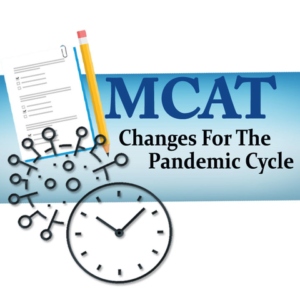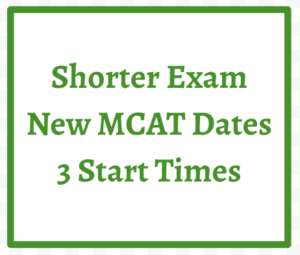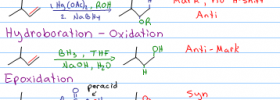 It’s a crazy time to be living in 2020. Like it or not, this global pandemic has affected almost every area of life. Sadly, the MCAT and med school application cycle are not exempt from the craziness.
It’s a crazy time to be living in 2020. Like it or not, this global pandemic has affected almost every area of life. Sadly, the MCAT and med school application cycle are not exempt from the craziness.
Let's make a plan by first understanding what the changes are to the test and, more importantly, how you can prepare to be successful on this new, shorter version of the MCAT.
First things first, how is the pandemic MCAT different from the old test? How long is given for each section? And which questions have been removed? For answers to these and more, stop and view the following article as well as my AAMC Pandemic Update videos.
Shorter MCAT, Multiple Start Times and New Test Dates: AAMC Pandemic Update

The AAMC announced MCAT changes for the 2020 Pandemic cycle.
These include:
shorter exams, three exam start times, and three new MCAT test dates.
Here's how these changes impact your timeline and how to still meet your goals!
Shorter MCAT, New Dates, Start Times and Cycle Changes – Understanding AAMC Updates

This video addresses the recent updates to the MCAT and medical school application cycle for the 2020 calendar year.
I discuss the new testing dates and times provided by the AAMC. The physical changes to individual exam sections, and changes to the AMCAS application process are also explained. You’ll also hear my advice for choosing a new test date, signing up, and mentally preparing for the new exam format.
How To Practice AAMC Exams in 5:45 For the Shorter MCAT
 In this video, I’ll show you three different options for practicing and preparing for the new, 5 hour and 45 minute MCAT.
In this video, I’ll show you three different options for practicing and preparing for the new, 5 hour and 45 minute MCAT.
How do you use the longer 7+ hour AAMC practice exams? You can choose one of these options for your Phase 3 preparation. These are based on how much time you have and how accurate you want your scores to be.
Passage Timing for the Shorter MCAT – Revised Pacing Strategy

In this video, I’ll show you a strategy for pacing your completion of the passages on the shorter, pandemic MCAT. You’ll learn how to make sure you’re always on track throughout the science and CARS sections of the test, never going too fast and never running out of time.


